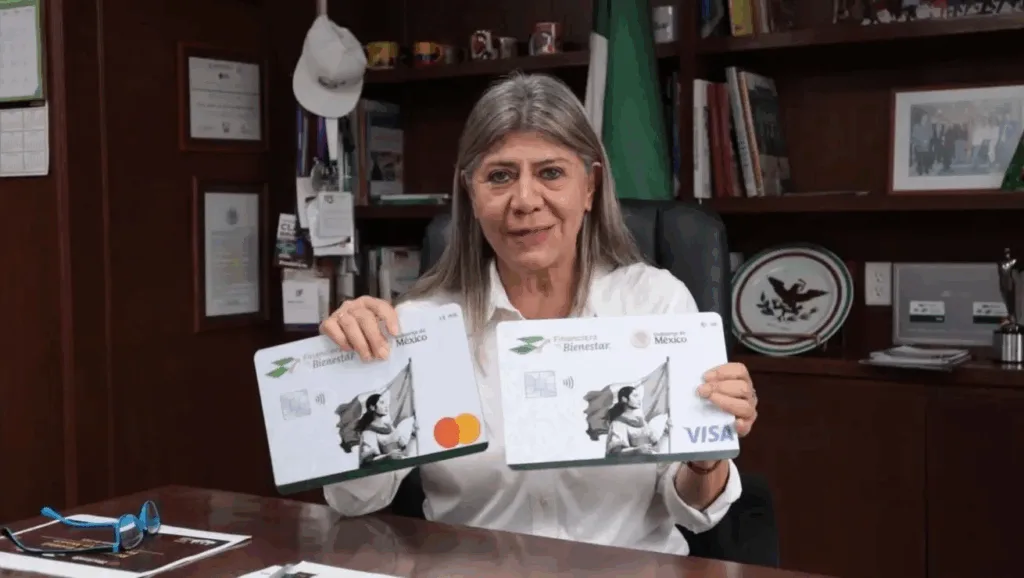Aug 27, 2025
Mexican officials say the Finabien Paisano Card will help ensure Mexican immigrants in the U.S. keep more of their hard-earned money.

Rocío Mejía Flores, general director of Finabien. (Credit: Mexican Press Agency)
By Pamela Cruz
Mexico’s government has released a new tool intended to blunt the impact of a pending U.S. tax on remittances. The Finabien Paisano debit card will allow Mexican immigrants in the U.S. to send remittances and receive direct deposits while avoiding high fees and taxes.
Mexican officials say the card will help ensure Mexican immigrants in the U.S. keep more of their hard-earned money.
“It’s not just an electronic wallet,” explained Rocío Mejía Flores, general director of Finabien, the agency in charge of the program. “It’s a bank account with which our compatriots can send money, receive their paychecks, deposit checks, and pay for services, both in the United States and Mexico.”
She added the card will help promote more inclusive banking as well as greater savings and investment opportunities.
In 2024 Mexico received some $64.75 billion in remittances, most of it from immigrants living in the United States. Fees for services can vary, with some agencies offering free transfers but with built-in exchange rate margins.
Starting in January, a 1% tax will be imposed on all cash remittances sent from the U.S., though money sent via electronic or card-based transfers will be exempt.
Mexican President Claudia Sheinbaum noted in a statement in July that up to 30% of remittances from the United States are sent in cash, often from small stores that provide such services usually for high fees.
According to Mejía, with the Finabien Paisano Card, sending remittances will cost $2.99 per transaction, compared to the $7 to $14 charged by traditional remittance agencies. The usage limit is also competitive: up to $2,500 per day and $10,000 per month, with full traceability and banking security in both the U.S. and Mexico.
“We want migrants to stop spending on unfair fees. That’s why we lowered the fee and improved the exchange rate. This is a government effort to protect their money,” Mejía emphasized.
Guaranteed Security
Data security is a growing concern for many immigrants in the U.S. amid stepped up immigration enforcement. Reporting shows the U.S. government is working to gain greater access to individual data—including tracking remittance transfers—as part of its campaign of mass deportations.
“The only ones who have access to the information are the bank and our agency,” stressed Mejía. “It is not shared with tax offices or treasuries. Your data is fully protected by law.”
Applications are available at any of the 53 Mexican consulates in the United States. Cards can also be ordered by mail with delivery times of less than two weeks and with applicants paying only the shipping cost.
Those interested will be required to provide a consular registration card—issued by Mexican consulates to Mexican citizens living in the U.S. regardless of immigration status—or other form of official identification, proof of address, and an email address.
Supporting ‘migrant heroes and heroines’
In addition to transfers, Finabien card will gain access to the “virtual vault” where they can keep their savings with a 10 percent annual return on deposits of up to 24,000 pesos (just over $1200) per month.
Finabien is also working to allow direct investment from the card in Mexican bonds, or CETES. “The migrant community has asked us for this, and we are already in talks with the Treasury and the National Banking Commission. We want their savings to work for them,” Mejía said.
With more than 60,000 active cards in the U.S. in just one month, Finabien seeks to bridge the digital divide with tutorials, personalized advice, and a Finabien Friends network, which organizes virtual meetings with migrants from California, Texas, New York, Illinois, and Colorado.
“It’s not just any bank or private company; the Mexican government is behind it. We have 170 years of experience in remittance payments. We want our countrymen to know that their money and their families are supported,” Mejía emphasized.
“Our mission is clear,” she added, “to support, without corruption and in a transparent manner, our migrant heroes and heroines, who support their families and Mexico with their efforts. It is an act of justice for those who have never stopped sending their support to the country.”






